Why a Quiet Gaming Rig is the Ultimate Upgrade
A silent gaming desktop pc transforms your gaming sessions by eliminating distracting fan noise, letting you focus on the rich audio world of your game. Imagine hearing the subtle footsteps of an opponent around a corner or becoming fully lost in the atmospheric soundtrack of an open-world trip. This immersion is lost when your computer is too loud. Achieving this requires smart component selection, focusing on both acoustics and performance.
Key components for a silent build include:
- Case: Look for models with sound-dampening materials and an airflow-focused design.
- CPU Cooler: Large air coolers with low-RPM fans are often quieter than smaller, faster-spinning ones.
- GPU: Prioritize models that feature a zero-RPM mode for silence during light use.
- PSU: An 80 PLUS Gold rated power supply with a semi-passive fan mode is ideal.
- Fans: Larger 140mm fans can move the same amount of air as smaller fans but at a lower, quieter speed.
- Storage: SSDs are completely silent, as they have no moving parts like traditional hard drives.
A typical gaming PC operates around 30-50 decibels, the level of a normal conversation. A well-designed quiet build aims to keep noise levels closer to a whisper, even under load. This isn't just about a better gaming experience; it's a sign of a healthy, efficient machine. Cooler components require less fan intervention, creating a positive cycle of high performance and low noise. These principles are essential whether you are planning a high performance gaming pc build from scratch or choosing from pre built gaming computers.
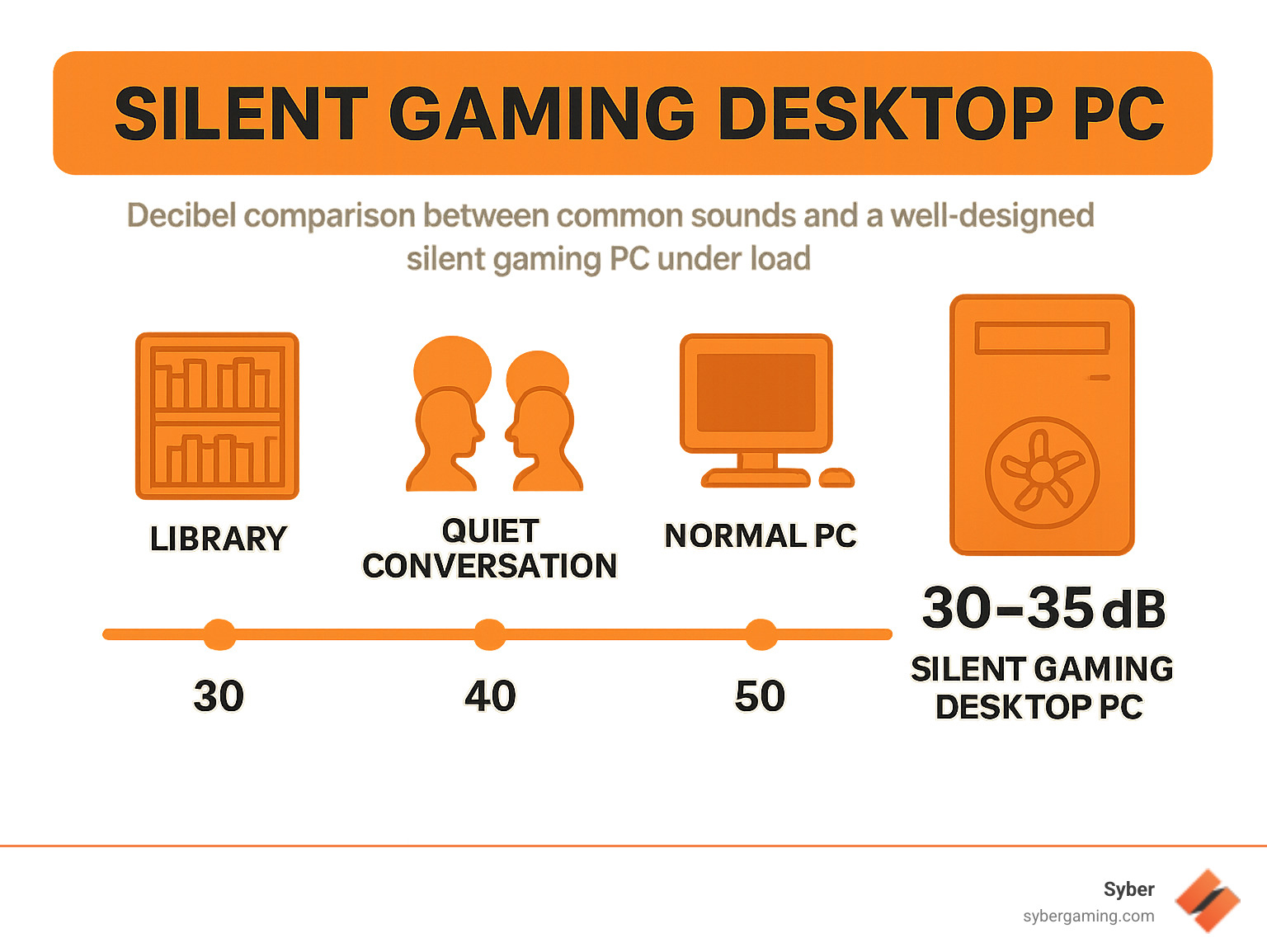
Explore more about silent gaming desktop pc:
How to Build a High-Performance Silent Gaming Desktop PC
Building a silent gaming desktop pc means choosing components that deliver power without the noise. Let's break down what you need for a machine that lets you focus on the game.
The Blueprint: Choosing Your Core Components
Each part you select plays a role in the final noise level.
PC Case
Your case is the foundation of a quiet build and your first line of defense against noise. Look for these features:
- Sound-Dampening Materials: Silent cases often use dense materials like acoustic foam on the panels to absorb sound.
- Solid Construction: Heavy steel or aluminum cases vibrate less and block more noise.
- Vibration Dampening: Look for rubber grommets for mounting fans and drives. These small details isolate vibrations, preventing them from transferring to and being amplified by the case chassis.
- Optimal Airflow Design: This creates a trade-off: solid panels block noise but restrict airflow, while mesh panels improve airflow but let noise escape. The best cases balance these, using smart vent placement for a clear air path. Many quiet cases also feature a PSU shroud to hide cables and isolate heat and noise from the power supply.
Syber's Cube Series cases are designed with both aesthetics and quiet functionality in mind for your high performance custom prebuilt gaming pc.
CPU
The CPU's heat output is measured in Thermal Design Power (TDP). A CPU with a lower TDP will naturally require less cooling, resulting in less fan noise. For more powerful CPUs, you don't have to sacrifice silence. You can often set a BIOS power limit to cap heat output. This reduces noise with a minimal impact on gaming performance, contributing to a quiet high performance desktop pc.
GPU
The graphics card is often the loudest component in a gaming PC. To minimize its noise:
- Zero-RPM Modes: Many GPUs feature zero-RPM modes, where fans stop under light loads for total silence during desktop use.
- Premium Heatsink Designs: Look for GPUs with large, dense heatsinks and multiple high-quality fans. A more effective cooler dissipates heat better, allowing the fans to run at lower, quieter speeds.
- Check Professional Reviews: Don't just rely on marketing. Look for in-depth reviews that include noise level testing, often shown in decibels (dBA) under idle and load conditions. This is the best way to know how loud a card will actually be.
- Consider Undervolting: Advanced users can undervolt the GPU. This software tweak reduces voltage, lowering heat and fan speed without sacrificing performance.
- Beware of Coil Whine: This high-pitched electrical buzz varies by card, so check reviews to avoid models known for it.
Future GPUs with AI-powered graphics will manage workloads more efficiently, reducing heat and noise.
PSU (Power Supply Unit)
An inefficient Power Supply Unit (PSU) wastes energy as heat, forcing its fan to spin up and create noise. For a silent gaming desktop pc, choose a PSU with:
- 80 PLUS Gold Rating (or higher): This certification guarantees efficiency. Higher ratings like Gold, Platinum, or Titanium waste less energy as heat. Gold is often the best balance of price and efficiency for a quiet build.
- Semi-Passive Mode: Also known as a zero-RPM mode, this feature keeps the PSU fan off during low to medium power draw, ensuring total silence for less demanding tasks.
- Sufficient Capacity: Buying a PSU with 20-30% more wattage than needed keeps it in its most efficient range, making it run cooler and quieter.
Storage
For a truly silent PC, Solid State Drives (SSDs) are essential. Unlike traditional hard disk drives (HDDs) that use spinning platters and a mechanical arm, SSDs have no moving parts. This makes them completely silent, much faster, and more durable.
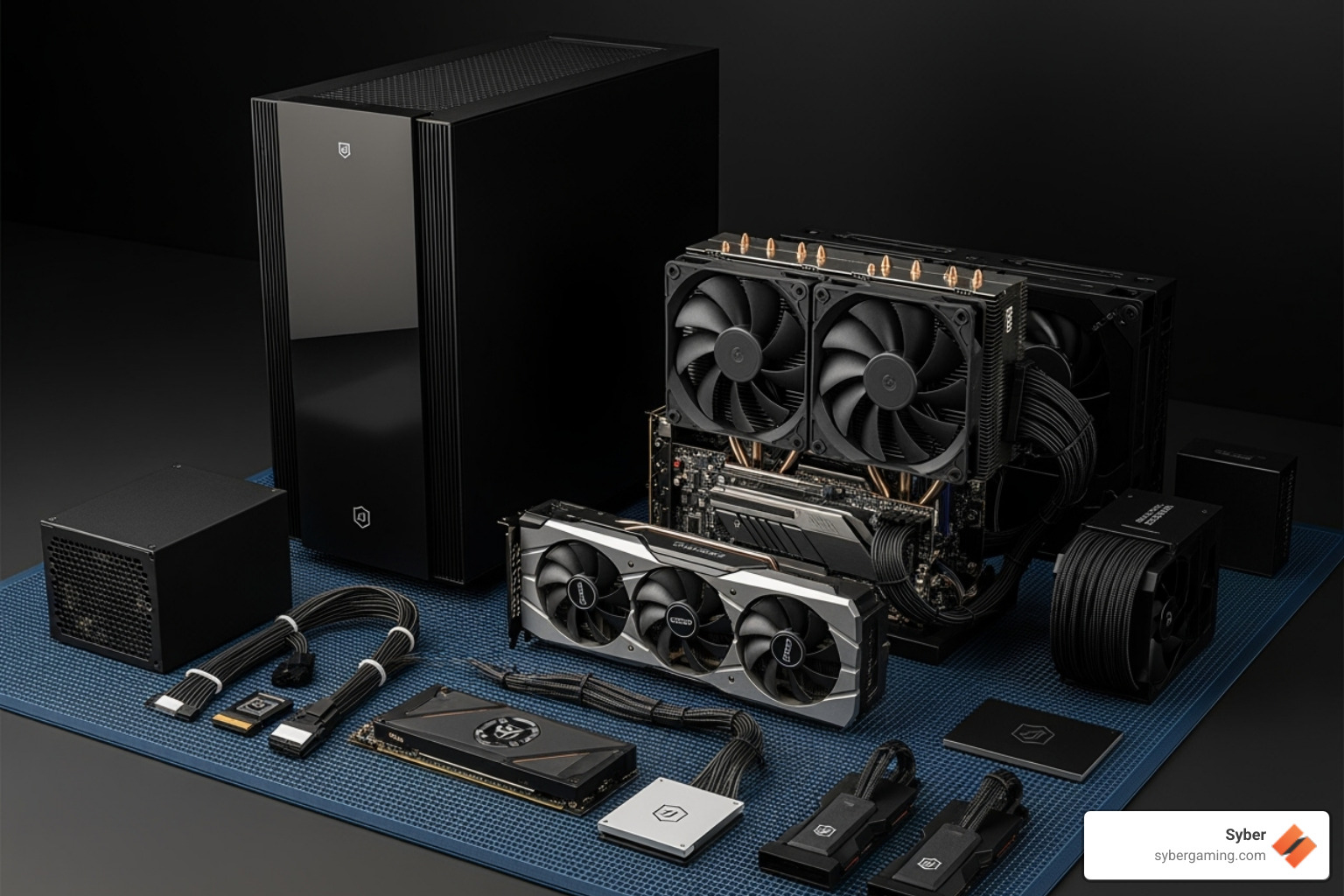
The Art of Airflow: Mastering Your Cooling System
Once you have quiet components, you need an effective cooling system to keep them that way.
Air Coolers
A large tower-style air cooler is a cornerstone of a silent build. These use copper heat pipes to pull heat into a large fin stack, where a large, slow-spinning fan quietly dissipates it. The large surface area means the fan doesn't have to spin fast (and loud) to be effective.
Case Fans
Like CPU fans, larger case fans (140mm or even bigger) are quieter because they can move more air at lower rotational speeds (RPMs) than smaller fans. Fan bearing type also matters:
- Sleeve Bearings: Inexpensive but less durable and can become noisy over time.
- Ball Bearings: Very durable but can be noisier than other types.
- Fluid Dynamic Bearings (FDB): These are best for silent builds due to their quiet operation and long lifespan.
Use PWM (Pulse Width Modulation) fans for precise, temperature-based speed control by the motherboard.
Fan Curves
Customizing your fan curves in the BIOS or with software is a free and powerful way to reduce noise. Instead of letting fans run at a constant speed, you can set them to ramp up gradually only when temperatures rise past a certain point. Use the hysteresis setting, if available, to add a delay. This prevents fans from annoyingly speeding up and slowing down every time the temperature changes by a degree or two. AI cooling solutions can even automate this process for optimal quiet.
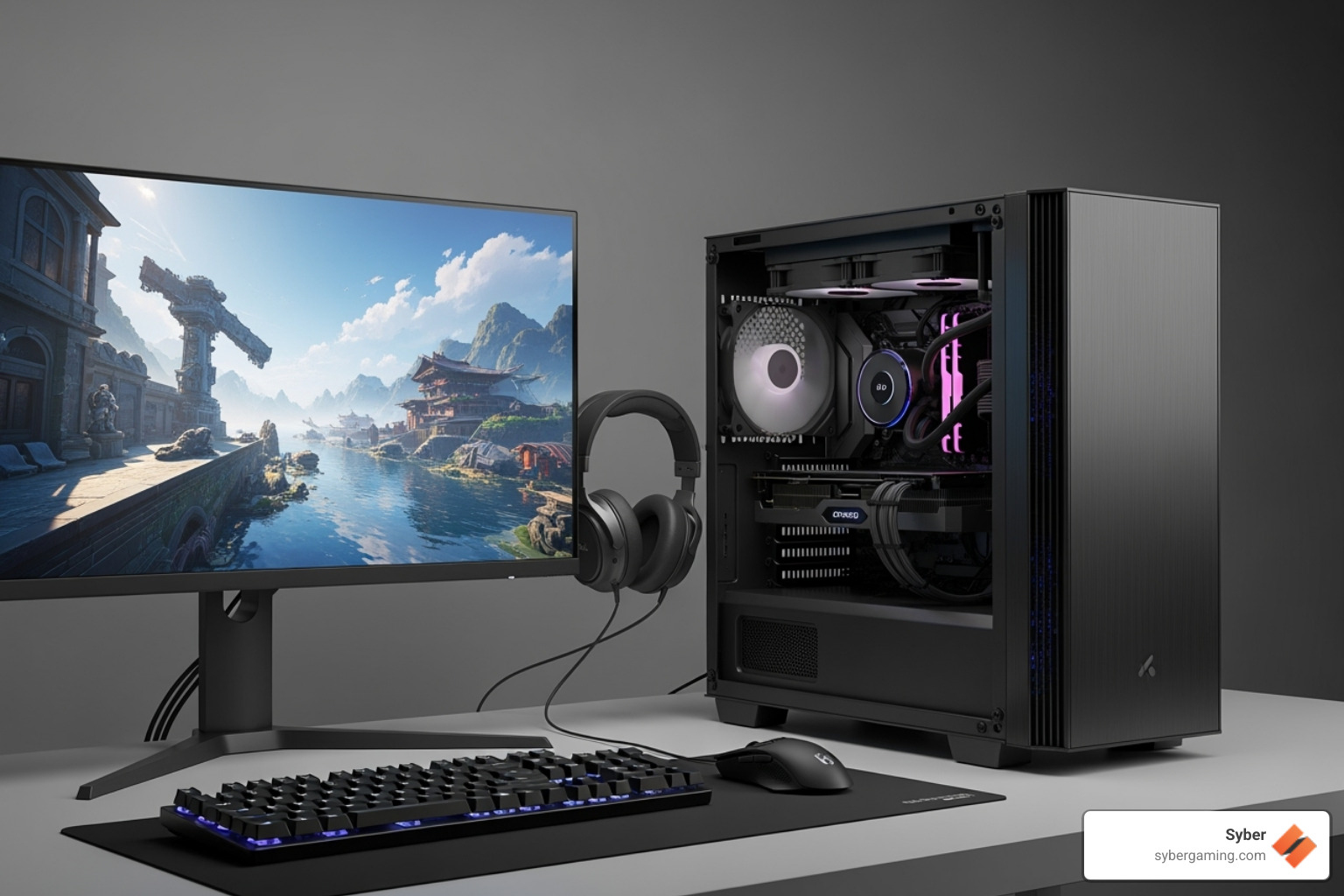
Fine-Tuning Your Silent Gaming Desktop PC for Peak Performance
Cable Management
Clean cable management is not just for looks; it is crucial for quiet performance. Messy cables obstruct airflow, forcing fans to work harder. Clean cable management ensures a clear air path from intake to exhaust, improving cooling efficiency.
Maintenance
Dust is the enemy of a quiet PC. Over time, dust builds up on fan blades and heatsinks, acting as an insulator. This traps heat and forces fans to spin faster to compensate. Clean your PC's filters and internals with compressed air every 3-6 months to maintain optimal, quiet performance.
Troubleshooting Noise
If your PC suddenly becomes noisy, you need to identify the source:
- Whirring: A fan is the most likely culprit. It could be failing or simply running too fast due to heat.
- Clicking: This often indicates a failing hard drive. It can also be a cable that has shifted and is now hitting a fan blade.
- Buzzing/Whining: This is often 'coil whine' from the GPU or PSU, an electrical noise that can be annoying.
Use software to monitor component temperatures and control fan speeds individually to help pinpoint the problem. Modern AI system optimization can help predict thermal loads and adjust performance to maintain a quiet state.
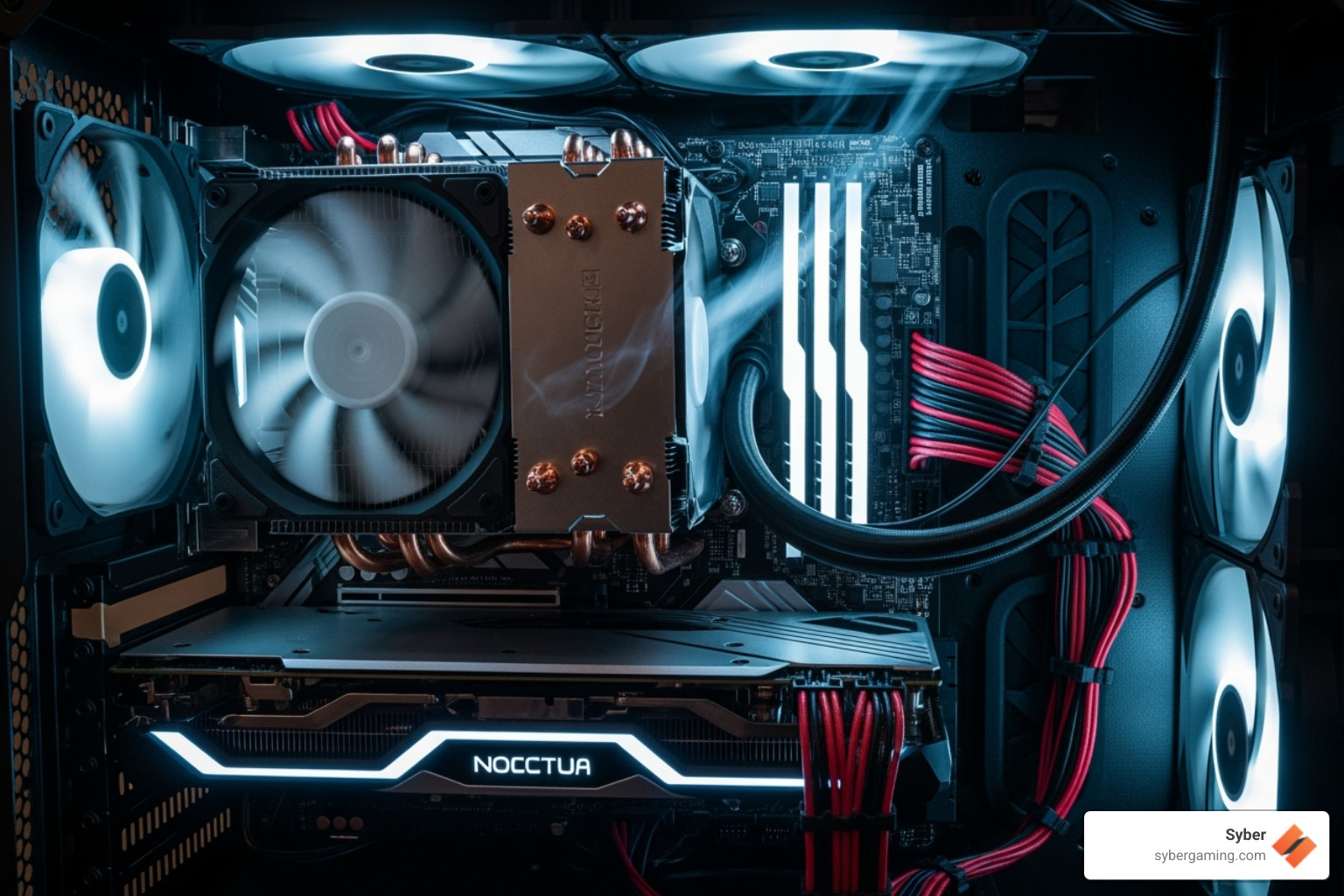
The Final Verdict: Your Path to a Quiet Gaming Experience
Now that you understand the principles of silent computing, how do you get your own quiet rig? You have two main paths: building it yourself or opting for a professionally assembled machine.
DIY vs. Pre-Built: Assembling Your Silent Gaming Desktop PC
Building your own PC offers total control, which can be rewarding. However, it requires a significant investment of time for research, part selection, and the build process itself. A single incompatible part or a mistake during assembly can lead to costly damage and frustrating troubleshooting. You also have to manage separate warranties for each part.
This is where pre built gaming computers from experts like Syber excel. Our technicians are specialists in crafting each high performance custom prebuilt gaming pc for both power and peace. We perform rigorous testing to eliminate noise issues like coil whine or fan vibration. A customizable pre built gaming pc from Syber saves time and includes a comprehensive system warranty for peace of mind.
| Factor | DIY Build | Pre-Built System |
|---|---|---|
| Time Investment | Weeks of research and assembly | Ready to game immediately |
| Total Cost | Lower initial parts cost, but potential for hidden expenses and mistakes | Higher upfront cost that includes labor, testing, and support |
| Technical Skills | Requires significant knowledge and patience | No expertise needed |
| Warranty Coverage | Individual warranties for each part | Comprehensive warranty for the complete system |
| Customization Level | Unlimited options, but requires compatibility research | Extensive choices within a curated, compatible list |
| Performance | Dependent on builder's skill in tuning and assembly | Professionally optimized for thermal and acoustic performance |
For those who want gaming pc high performance without the hassle, custom build gaming pcs from experienced builders offer the best of both worlds.
Completing Your Setup and Final Thoughts
Your silent gaming desktop pc is the centerpiece of an immersive setup. Complete the experience with quiet peripherals. Dampened keyboards, vibration-absorbing desk mats, and soft-click mice can further reduce noise. A quality pair of noise-canceling headphones can also help block out any remaining ambient sound, putting you completely in the game.
The future of PC performance is trending quieter. Innovations like AI-driven performance and AI cooling solutions are set to make systems even smarter about managing heat and noise dynamically. At Syber, we believe that performance meets peace. Our high performance desktop pc systems, like the feature-rich M-Series, are engineered from the ground up to deliver the powerful, immersive, and quiet gaming experience you deserve.
Ready to hear your games instead of your PC? Contact Syber today, and let our experts help you configure the silent gaming desktop pc of your dreams.


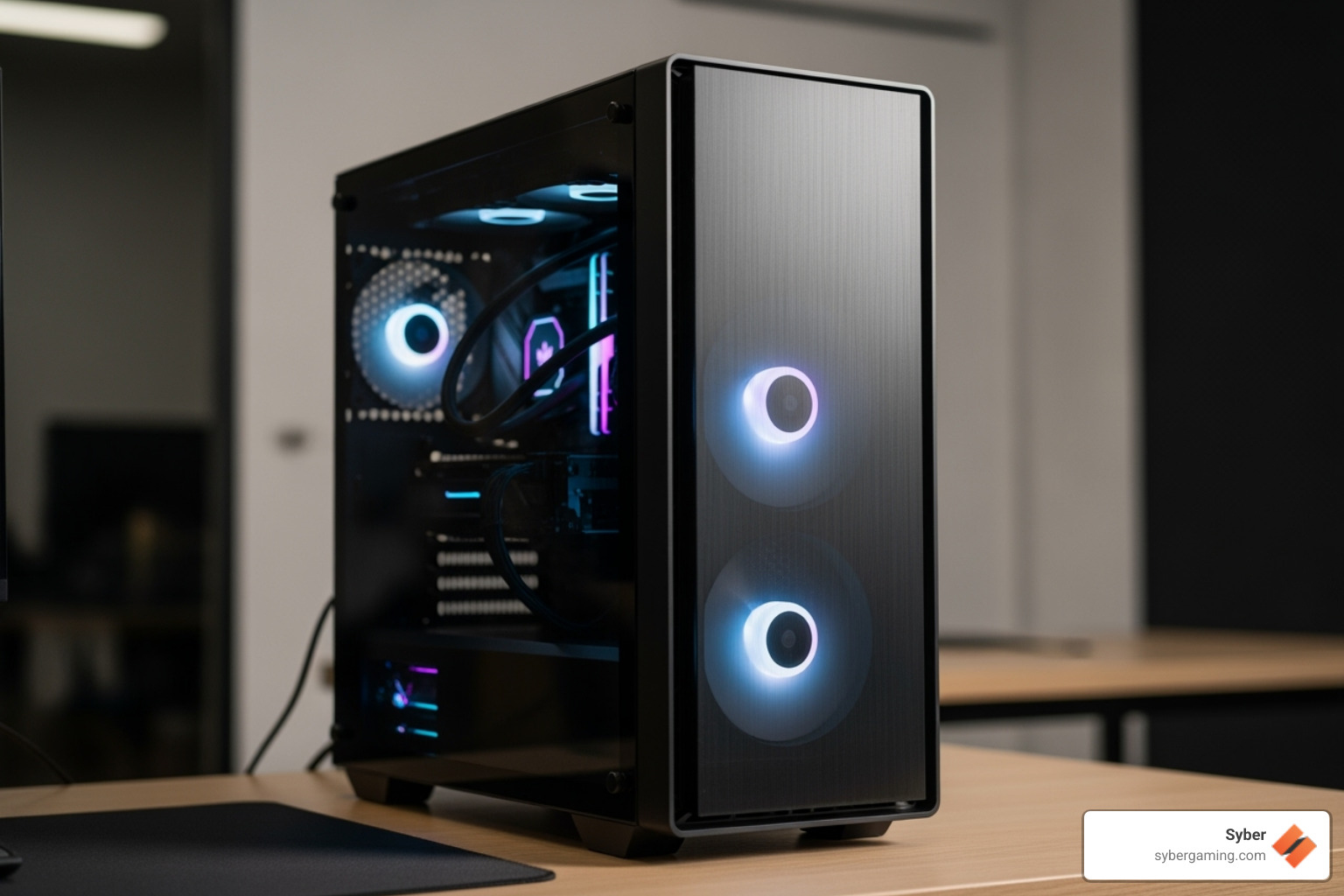



.svg)

